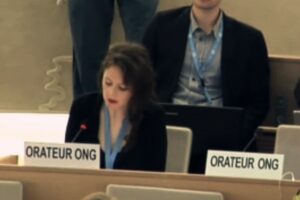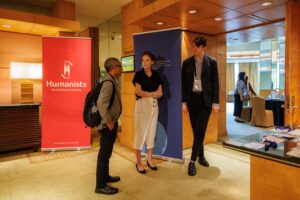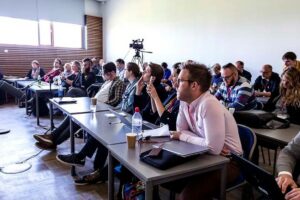Representing the humanist movement, advocating on its behalf, and promoting human rights priorities based on humanist values at international institutions is a core role and function of Humanists International. We do this by: advocating at the United Nations; providing training sessions to external stakeholders; and supporting our members in human rights advocacy via workshops, training opportunities and briefings.
Advocacy at the United Nations
Humanists International enjoys Special Consultative Status at the United Nations in Geneva, Vienna, and New York (including General Consultative Status at UNICEF) and is an NGO in official partnership with UNESCO, with Associate Status.
United Nations in Geneva
At the UN in Geneva, Humanists International engages with the UN Human Rights Council and its special procedures, the work of the Office of the High Commissioner for Human Rights and the UN Treaty Bodies. We do this by: delivering oral and written statements; lobbying on UN resolutions; holding side-events; making submissions; giving briefing and training sessions to officials; and meeting, and working with, State representatives, experts and other civil society organizations. Humanists International has a position as chair of the UN NGO Committee on Freedom of Religion or Belief, in Geneva.
United Nations in New York
At the UN in New York, Humanists International engages with the work of the General Assembly, specifically its Third Committee (which focuses on social, humanitarian affairs and human rights issues), the Commission on the Status of Women (CSW) and the UN Population Fund. We do this by: attending conferences and meetings, including CSW’s annual two-week session; making submissions for the reports of priority Special Procedures and following their interactive dialogues; meeting with UN staff and State missions; and by collaborating with other members of civil society. We also monitor the work of the ECOSOC Committee on NGOs, and lobby for its reform and better functioning.
United Nations Educational, Scientific and Cultural Organization (UNESCO)
At UNESCO, Humanists International engages primarily on the areas of cultural rights and education. We do this by attending meetings, such as UNESCO’s General Conference, making statements and submissions, and by working with its International Conference of NGOs to help inform and influence recommendations. Specifically within the area of cultural rights and freedom of artistic expression, we attend and participate in events organized around the 2005 Convention on the Protection and Promotion of the Diversity of Cultural Expressions, such as the Session of the Conference of Parties to the Convention, and the Civil Society Forum. We also monitor resolutions and the election of members to the Intergovernmental Committee.

